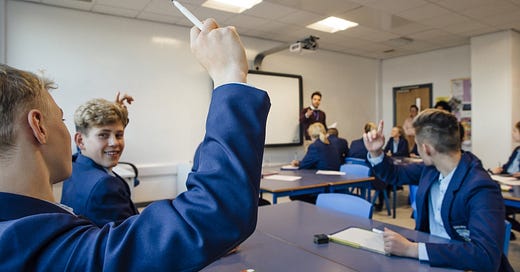After the 'Gove revolution': how can state education be improved?
Toby Marshall reflects on a recent Education Forum discussion.
I was very pleased to chair an Academy of Ideas Education Forum discussion last month, exploring the often-fraught relationship between politics and education in the context of the fast-approaching UK General Election. As chair, I wanted to encourage an open and honest debate between rival educational perspectives.
There are many things that teachers need to urgently discuss if we are to move state education forward. To do so, we need to have a robust but also respectful exchange of ideas. My hope was that our debate would make a small contribution to that discussion.
As preparation, I had read the pre-election literature of both of the major political parties, and I have to say I went into our discussion with some serious concerns about the future.
If elected, it seems that the Labour Party intends to rewrite the school curriculum, giving a greater emphasis to instrumental objectives, such as the promotion of the mostly political concept of diversity, as well as the economic goal of vocational training. I really think this is the wrong direction of travel for compulsory state education.
Unlike the Labour Party, I believe that the focus of schools ought to be on providing the next generation with universal access to powerful knowledge. If anything, English state schools, in my view, need to become more, not less, academic in their focus. Teachers ought to be fostering the spirit of intellectual freedom and ambition in the young, not fitting them into a job, or promoting conformity to the political ideals of adults.
At the same time, the pre-election literature of the Conservative Party suggests that they have no real alternative to the Labour Party.
Whatever one thinks of Michael Gove, and I have many criticisms to make, he did at least make academic education central to English state-education policy during his time as secretary of state for education, from 2010 to 2014. (You can read my thoughts on Gove's achievements here.) Today, I just don't know what the Conservatives stand for in terms of education. The policies they are hailing as a success after 13 years in power - such as extra funding for lessons missed during lockdown - strike me as very minor indeed. And anyway, it was the Conservative Party that chose to close schools during lockdown.
With all this in mind, I went into our debate with a very low view of the major political parties, but with the belief that we might be able to do better if we got a few committed teachers and educationalists together. I wasn’t disappointed.
Our discussion covered a wide range of issues, including the importance of knowledge within the curriculum, the negative impact of lockdown on the maturation of the young, the contradictory impact of performance-management systems within education, as well as the perennial problem of new teacher recruitment, training, retention and development.
Each of the speakers had a lot to say about these issues and I was pleased that they took care to avoid the simplistic and often reductive polarities that too often characterise much of the political discussion of state education.
You can watch the debate below. I hope you enjoy it and find that it helps you think through some of the problems we must confront. I certainly did.
Toby Marshall is a teacher of film studies and a member of the AOI Education Forum.
The Academy of Ideas Education Forum is a discussion group for anyone interested in education. It stands for free thinking, free speech and lively but good-natured debate in the belief that understanding is reached through the friendly contestation of ideas. At a time when educational groupthink is rife, the Forum gives voice to a diverse range of views which rarely get heard. Watch previous debates and find out more here.
The Forum also regularly produces debates at the Battle of Ideas festival. To buy discounted early-bird tickets for this year’s festival - on Saturday 19 & Sunday 20 October at Church House, London - visit the Battle of Ideas tickets page.
Don’t miss our next Education Forum…
Religion in schools: protecting or neglecting the faithful?
Thursday 25 April, 7:00pm
Accent Centre, 12 Bedford Square, London WC1B 3JA - map
Tickets cost £7 (£5 concessions) and are available via Eventbrite.
A High Court judgement hangs over Michaela Community School for banning ritual prayer. A Wakefield school suspended pupils for damaging a copy of the Quran. Two recent studies claim that faith schools select against poor and SEN children. Two thirds of the liberal Alliance Party in Northern Ireland want Catholic schools banned. Three years after showing pupils images of the Prophet Muhammad, a teacher in the north of England remains in hiding.
It seems undeniable that schools are a new crucible for religious and social conflict. How do we navigate between tolerance and intolerance in these disputations?
Our next Education Forum event tackles contrasting contemporary notions of pluralism and secularism and considers how they play out in schools.
How does the right of faith communities to exercise their beliefs reconcile with established wider freedoms? Should the right to pray be available to all – even in non-religious schools? Should we defend a parent’s right to send their child to a faith school? Or is that tantamount to a defence of privilege? Have we lost sight of whether faith-based liberties impinge on secular freedoms or vice versa? Who are the liberals and illiberals here?
‘What kind of school environment could so easily be destroyed by one group of students publicly expressing their religion for a mere few minutes a day?’, asks author and teacher Nadeine Asbali. She describes the ban on Muslims praying in school as ‘a dystopian, sinister vision of multiculturalism’. Yet commentator Tim Black thinks, ‘we are witnessing not quiet displays of faith, but loud all-too-visible assertions of Muslim identitarianism … with little to do with Islam’.
Has tolerance become too abstract and impoverished to deal with concrete forms of cultural and religious difference? What do you think: are our schools fighting an age-old battle between sacred and secular visions of society, or are they on the front line of a new culture war?
SPEAKERS INCLUDE:
Khadija Khan journalist and commentator
Gareth Sturdy former teacher and religious affairs journalist
CHAIR: Kevin Rooney teacher and Education Forum convenor






